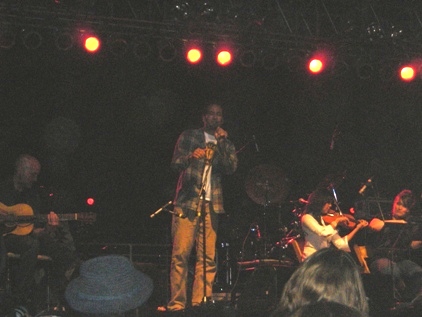|


© tt eiland, 2009 |
American Folk Scene, 1950's and 1960's |
American Folk Scene, 1950's and 1960's was an offshoot of the BEAT movement and the folk scene. ROOTS
The protest folk music scene of the 50's and 60's centered around the Bohemian Greenwich Village section of New York, where poor artists, students and musicians enagaged in late night informal gatherings with music, poetry, and political rantings. The Hootenannies occured at various coffee houses and bookstores that populated the area, such as Bleaker Steet's Bitter End and the Hungry I. What had been music of the working class became protest music from the likes of Pete Seeger, Phil Ochs and Bob Dylan and introspective analyses of a personal nature, a confessional style exemplified by Dylan, Joan Baez and Judy Collins. "...in the folk tradition, they were generally musically simple, but lyrically, they were the best of poetry, with even the protest songs being gentle and allegorical. There was almost always a kind of detachment and poetically indirect quality to the language that made the songs more profound" (Graham). These works helped spawn both the protest rock and Urban protest music of the 70's, as well as a resurgence in singer/songwriters in the 70's and the 90's. LYRICAL THEMES
Themes in the 50's (and especially) 60's folk lyrics tend to reflect not simply the tribulations and joys of the lower class working person, but more universal themes of the underdog, including labor, leftist politics, pacifism, and general antiestablishment rhetoric. WHAT TO LISTEN FOR
What was regional, religious or cultural pride evolved into leftist politics, passion, and anger. This folk music is still primarily identified with western European chord patterns and melodies using acoustic instruments and prominent vocalization, including complex harmonies. Instrumentally, guitar, acoustic bass and harmonica are common. 4 BIG NAMES
Peter, Paul and Mary; Joan Baez; Pete Seeger; Bob Dylan Works Cited
Graham, George. Bleaker Street. George Graham, 1999.
http://georgegraham.com/reviews/bleeker.html.
Pegg, Carole. Folk. New Grove Dictionary of Music and Musicians, 2nd ed.
S. Sadie and J. Tyrrell. London: Macmillan, 2001.
© T. T. Eiland, January 1998
Last modified: January 12, 2003
|
